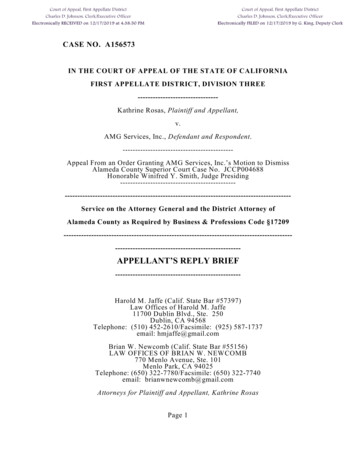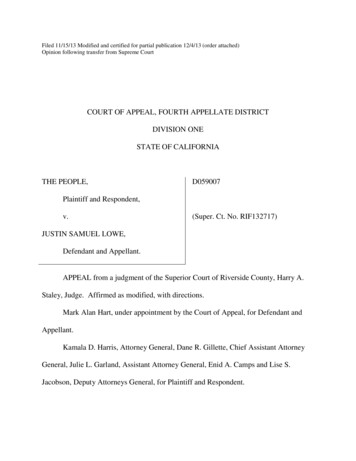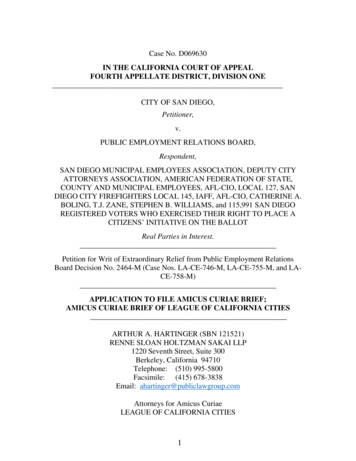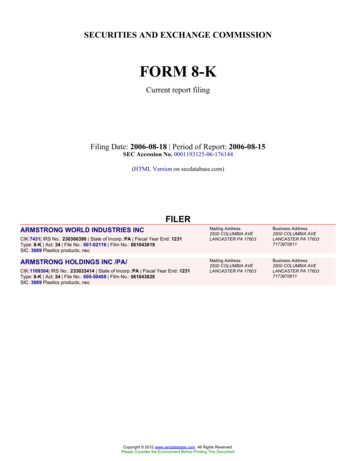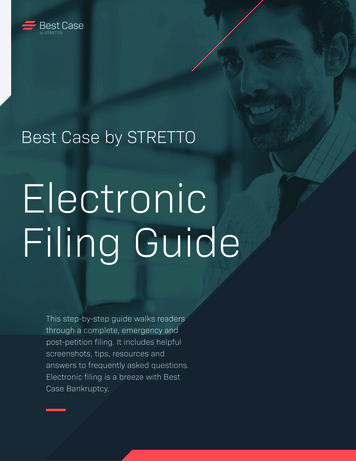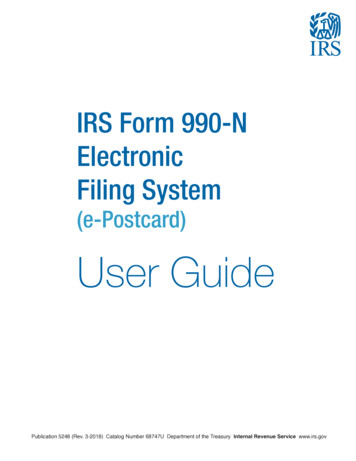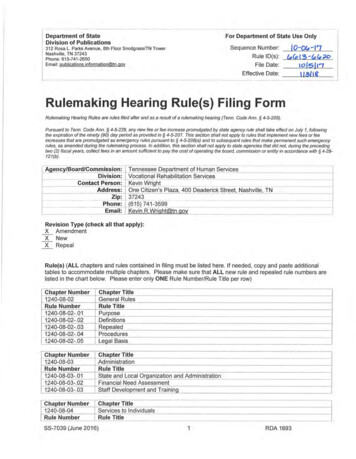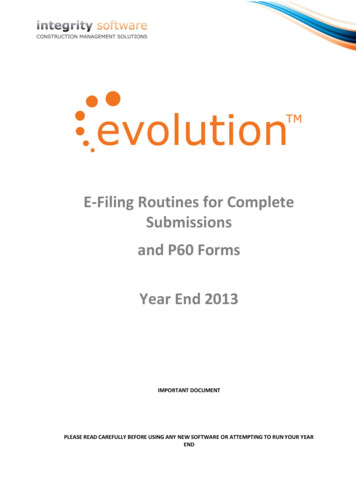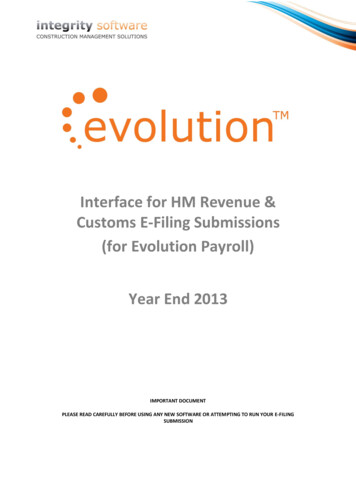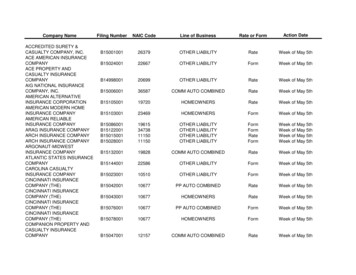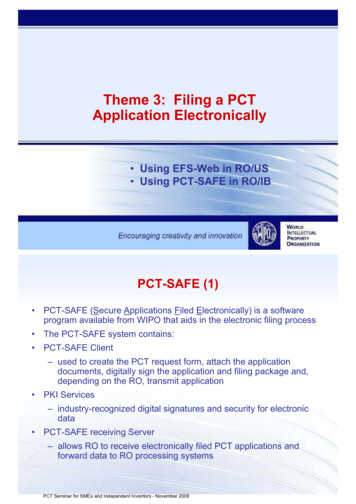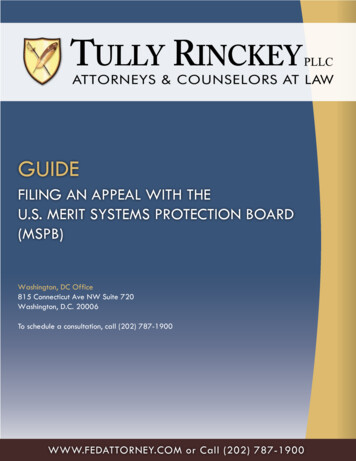
Transcription
GUIDEFILING AN APPEAL WITH THEU.S. MERIT SYSTEMS PROTECTION BOARD(MSPB)Washington, DC Office815 Connecticut Ave NW Suite 720Washington, D.C. 20006To schedule a consultation, call (202) 787-1900WWW.FEDATTORNEY.COM or Call (202) 787-1900
A GUIDE TO FILING AN APPEALWITH THE U.S. MERIT SYSTEMS PROTECTION BOARD (MSPB)INFORMATION CONTAINED IN THE DOCUMENT IS NOT MEANT TO CONSTITUTELEGAL ADVICE OR THE CREATION OF AN ATTORNEY/CLIENT RELATIONSHIP Tully Rinckey PLLC 2011
TABLE OF CONTENTSI.WHAT IS THE MSPB?.1II.WHAT TYPES OF ACTIONS CAN BE BROUGHT BEFORETHE MSPB? .1A. THE MSPB’S ORIGINAL JURISDICTION .2B. THE MSPB’S APPELLATE JURISDICTION .2C. WHISTLEBLOWER APPEALS.5i. OTHERWISE APPEALABLE ACTION.6ii. INDIVIDUAL RIGHT OF ACTION .6D. MILITARY LEAVE (BUTTERBAUGH) APPEALS .7E. VETERANS EMPLOYMENT OPPORTUNITIES ACTOF 1994 (VEO).8F. UNIFORMED SERVICES EMPLOYMENT ANDREEMPLOYMENT RIGHTS ACT OF 1994 (USERRA).9G. WHAT THE MSPB DOES NOT DO.10III.WHO CAN FILE AN APPEAL TO THE MSPB? .11IV.WHERE DO YOU FILE THE APPEAL? .12V.WHAT INFORMATION MUST BE SUBMITTED TOBEGIN AN APPEAL?.12A. FILING A “NOTICE OF THE DECISION TO TAKE THEACTION BEING APPEALED” .13B. ADDITIONAL DOCUMENTATION REQUIREMENTSFOR CERTAIN CLAIMS .14i. INDIVIDUAL RIGHT OF ACTION (IRA)APPEALS, INCLUDING CLAIMS OFRETALIATION FOR WHISTLEBLOWING .15ii. UNIFORMED SERVICES EMPLOYMENT ANDREEMPLOYMENT RIGHTS ACT (USERRA).15iii. VETERANS EMPLOYMENT OPPORTUNITIESACT (VEOA) .16iv. REQUEST FOR REGULATION REVIEW .16C. REMEDIES AVAILABLE.17VI.BY WHEN MUST YOU FILE AN APPEAL?.17iINFORMATION CONTAINED IN THE DOCUMENT IS NOT MEANT TO CONSTITUTE LEGAL ADVICEOR THE CREATION OF AN ATTORNEY/CLIENT RELATIONSHIP Tully Rinckey PLLC 2011
A. MOST APPEALS .17B. IRA APPEALS .17C. USERRA APPEALS .17D. VEOA APPEALS .18VII.CAN YOU DESIGNATE A REPRESENTATIVE?.18A. WHO YOU MAY DESIGNATE A REPRESENTATIVE .18B. HOW YOU MAY DESIGNATE A REPRESENTATIVE .18VIII.WHAT HAPPENS AFTER YOU FILE AN APPEAL?.18A. INITIAL APPEAL PROCESS .19B. STAY REQUEST .20C. MOTION PRACTICE .21D. DISCOVERY.22IX.COMMON REASONS FOR REJECTION OF APPEAL.24X.HOW CAN YOU APPEAL A FINAL MSPB DECISION?.25A. RIGHT TO A PETITION FOR REVIEW.25B. HOW TO FILE A PETITION FOR REVIEW .25XI.PURSING YOUR APPEAL THROUGH MEDIATION: ANALTERNATIVE TO THE APPEAL .27XII.REFERENCES.28iiINFORMATION CONTAINED IN THE DOCUMENT IS NOT MEANT TO CONSTITUTE LEGAL ADVICEOR THE CREATION OF AN ATTORNEY/CLIENT RELATIONSHIP Tully Rinckey PLLC 2011
I.WHAT IS THE MSPB?The MSPB is an independent, quasi-judicial agency in the executive branch that serves as theguardian of federal merit systems.1 The MSPB’s mission is to protect Federal merit systems andthe rights of individuals within those systems.2 The primary reason for creating the MSPB’sjurisdiction was to protect against partisan political and other prohibited personnel practices.3Key MSPB activities to this end include adjudicating individual employee appeals andconducting merit systems studies.4 In addition, the MSPB reviews the significant actions of theOffice of Personnel Management (OPM) to assess the degree to which those actions may affectmerit.5II.WHAT TYPES OF ACTIONS CAN BE BROUGHT BEFORE THE MSPB?For the MSPB to have jurisdiction over any appeal of a personnel action, it must possessjurisdiction over both the action and the employee filing the appeal. Approximately 2 millionFederal employees, or about two-thirds of the full-time civilian work force, currently have appealrights to the MSPB.6 Employees eligible to appeal specific actions vary in accordance with thelaw and regulations governing those actions. In some cases, classes of employees, such aspolitical appointees, are excluded.7 Employees of specific agencies, such as the intelligenceagencies and the General Accounting Office, are excluded with respect to certain actions.8Generally, employees who may appeal adverse actions and performance-based actions arethose in the competitive service who have completed a probationary period and those in theexcepted service (other than the Postal Service) with at least two years continuous service.Postal Service employees who may appeal adverse actions are preference-eligible employees1INFORMATION CONTAINED IN THE DOCUMENT IS NOT MEANT TO CONSTITUTE LEGAL ADVICEOR THE CREATION OF AN ATTORNEY/CLIENT RELATIONSHIP Tully Rinckey PLLC 2011
with one year continuous service and certain Postal Service supervisors, managers, andemployees engaged in personnel work.A. THE MSPB’S ORIGINAL JURISDICTIONThe MSPB has original jurisdiction over some matters, meaning that the MSPB can be thevery first agency to review a case. Consult 5 C.F.R. § 1201.2 for a list of claims over which theMSPB has original jurisdiction, which include the following:(1) Actions brought by the Special Counsel;9(2) Requests for informal hearings by persons removed from the Senior ExecutiveService for performance deficiencies;(3) Actions taken against administrative law judges.10B. THE MSPB’S APPELLATE JURISDICTIONThe MSPB also has appellate jurisdiction, because the MSPB can review decisions that havebeen made from within the MSPB or from other agencies. The MSPB was created to streamlineFederal personnel management, and therefore Congress did not make all personnel actionsappealable to the MSPB. Some actions that are not appealable to the MSPB may therefore beappealed to the Office of Personnel Management (OPM) or may be covered by agency grievanceprocedures.The MSPB’s jurisdiction includes certain actions involving removal, reduction in grade orpay, suspension, furlough, reduction-in-force actions, negative determinations of competence,determinations affecting retirement rights or interests, disqualifications, terminations, demotions,2INFORMATION CONTAINED IN THE DOCUMENT IS NOT MEANT TO CONSTITUTE LEGAL ADVICEOR THE CREATION OF AN ATTORNEY/CLIENT RELATIONSHIP Tully Rinckey PLLC 2011
failure to restore, and failure to re-employ. You can consult section 5 C.F.R. § 1201.3 for acomplete list of actions over which the MSPB has appellate jurisdiction, which include thefollowing:(1) Reduction in grade or removal for unacceptable performance;11(2) Removal, reduction in grade or pay, suspension for more than 14 days, or furlough for30 days or less for cause that will promote the efficiency of the service;12(3) Removal, or suspension for more than 14 days, of a career appointee in the SeniorExecutive Service;13(4) Reduction-in-force action affecting a career appointee in the Senior ExecutiveService;14(5) Reconsideration decision sustaining a negative determination of competence for ageneral schedule employee;15(6) Determinations affecting the rights or interests of an individual or of the United Statesunder the Civil Service Retirement System or the Federal Employees' RetirementSystem;16(7) Disqualification of an employee or applicant because of a suitability determination;17(8) Termination of employment during probation or the first year of a veteransreadjustment appointment when:(i) The employee alleges discrimination because of partisan political reasons ormarital status; or3INFORMATION CONTAINED IN THE DOCUMENT IS NOT MEANT TO CONSTITUTE LEGAL ADVICEOR THE CREATION OF AN ATTORNEY/CLIENT RELATIONSHIP Tully Rinckey PLLC 2011
(ii) The termination was based on conditions arising before appointment and theemployee alleges that the action is procedurally improper.18(9) Termination of appointment during a managerial or supervisory probationary periodwhen the employee alleges discrimination because of partisan political affiliation ormarital status;19(10) Separation, demotion, or furlough for more than 30 days, when the action waseffected because of a reduction in force;20(11) Furlough of a career appointee in the Senior Executive Service;21(12) Failure to restore, improper restoration of, or failure to return following a leave ofabsence an employee or former employee of an agency in the executive branch(including the U.S. Postal Service and the Postal Rate Commission) following partialor full recovery from a compensable injury;22(13) Employment of another applicant when the person who wishes to appeal to theMSPB is entitled to priority employment consideration after a reduction-in-forceaction, or after partial or full recovery from a compensable injury;23(14) Failure to reinstate a former employee after service under the Foreign Assistance Actof 1961;24(15) Failure to re-employ a former employee after movement between executive agenciesduring an emergency;254INFORMATION CONTAINED IN THE DOCUMENT IS NOT MEANT TO CONSTITUTE LEGAL ADVICEOR THE CREATION OF AN ATTORNEY/CLIENT RELATIONSHIP Tully Rinckey PLLC 2011
(16) Failure to re-employ a former employee after detail or transfer to an internationalorganization;26(17) Failure to re-employ a former employee after service under the Indian SelfDetermination Act;27(18) Failure to re-employ a former employee after service under the Taiwan RelationsAct;28(19) Employment practices administered by the Office of Personnel Management toexamine and evaluate the qualifications of applicants for appointment in thecompetitive service;29(20) Reduction-in-force action affecting a career or career candidate appointee in theForeign Service;30(21) Appeals under the Uniformed Services Employment and Reemployment RightsAct;31(22) Appeals under the Veterans Employment Opportunities Act;32(23) Appeals involving an allegation that the action was based on appellant's'whistleblowing.'33C. WHISTLEBLOWER APPEALSWhistleblowing means disclosing information that you reasonably believe is evidence of aviolation of any law, rule, or regulation, or gross mismanagement, a gross waste of funds, anabuse of authority, or a substantial and specific danger to public health or safety.34 It is a5INFORMATION CONTAINED IN THE DOCUMENT IS NOT MEANT TO CONSTITUTE LEGAL ADVICEOR THE CREATION OF AN ATTORNEY/CLIENT RELATIONSHIP Tully Rinckey PLLC 2011
prohibited personnel practice for an agency to take, threaten to take, propose, or not take apersonnel action because of whistleblowing activities.35 You are protected if you make such adisclosure to the Special Counsel, the Inspector General of an agency, or another employeedesignated by an agency head to receive such disclosures.36 You are also protected if you makesuch a disclosure to any other individual or organization (e.g., a congressional committee or themedia), provided that the disclosure is not specifically prohibited by law and the informationdoes not have to be kept secret in the interest of national defense or the conduct of foreignaffairs.37The Office of Special Counsel has jurisdiction over prohibited personnel practice complaintswith respect to a broad range of personnel actions, including appointments, promotions, details,transfers, reassignments, and decisions concerning pay, benefits, awards, education, or training.38There are two kinds of whistleblower appeals. The principal difference between the two is in theway they reach the MSPB.i. OTHERWISE APPEALABLE ACTIONIn the first kind of case, the individual is subject to a personnel action that is directlyappealable to the MSPB, and the individual claims that the action was taken because ofwhistleblowing.39 This kind of case is referred to by the MSPB as an "otherwise appealableaction," and the individual may file an appeal directly with the MSPB after the action has beentaken.40ii. INDIVIDUAL RIGHT OF ACTION6INFORMATION CONTAINED IN THE DOCUMENT IS NOT MEANT TO CONSTITUTE LEGAL ADVICEOR THE CREATION OF AN ATTORNEY/CLIENT RELATIONSHIP Tully Rinckey PLLC 2011
The second kind of case was created by the Whistleblower Protection Act41 and is referred toas an "Individual Right of Action." In this kind of case, the individual is subject to a personnelaction and claims that the action was taken because of whistleblowing, but the action is not onethat is directly appealable to the MSPB.42 In this kind of case, the individual can appeal to theMSPB only if he files a complaint with the Special Counsel first and the Special Counsel doesnot seek corrective action on the individual's behalf.43An individual who is subject to a personnel action that is directly appealable to the MSPBand who claims that the action was taken because of whistleblowing, may choose to file acomplaint with the Special Counsel rather than appeal to the MSPB.44 If the Special Counseldoes not seek corrective action on his behalf, the individual may then appeal to the MSPB.While this is considered an "otherwise appealable action," the time limits for filing are the sameas for an "individual right of action."45D. MILITARY LEAVE (BUTTERBAUGH) APPEALSIn Butterbaugh v. Dep’t of Justice,46 the U.S. Court of Appeals for the Federal Circuit heldthat agencies were not entitled to charge employees' military leave accounts for days when theywould not otherwise have been required to work at their Federal civilian jobs.47 By law, federalemployees who work for agencies that are covered by this section are to be given up to 15 daysof paid leave a year to attend training sessions required of them as members of military reservesor the National Guard.48 Until 2000, the Office of Personnel Management interpreted the law asproviding 15 calendar days of leave each year, rather than 15 work days, and federal agenciestherefore generally followed the practice of charging employees' military leave accounts for7INFORMATION CONTAINED IN THE DOCUMENT IS NOT MEANT TO CONSTITUTE LEGAL ADVICEOR THE CREATION OF AN ATTORNEY/CLIENT RELATIONSHIP Tully Rinckey PLLC 2011
absences on non-workdays (e.g., weekends and holidays) when those days fell within a period ofabsence for military training. In Butterbaugh, the court said that this was improper.If a Federal agency incorrectly charged you military leave for non-workdays so that you wererequired to use annual leave or leave without pay for any period for which you should have beenable to use military leave, the MSPB may order compensation for the resulting lost wages orbenefits. In addition, the MSPB may order the correction of military leave records by yourcivilian employing agency, the Defense Finance and Accounting Service (DFAS), and any otherrelevant agency.E. VETERANS EMPLOYMENT OPPORTUNITIES ACT OF 1994 (VEO)The Veterans Employment Opportunities Act of 1998 or VEOA is a federal law that providescertain federal employees and applicants with a means of redress in the event that a federalexecutive agency violates an employee’s or applicant’s veterans’ preference rights.49 BecauseVEOA primarily concerns the rights afforded to preference eligibles, i.e., individuals entitled toveterans’ preference, generally, only preference eligible employees and applicants are entitled tofile VEOA appeals.50 However, a non-preference eligible individual who has been separatedfrom the armed forces under honorable conditions after 3 years or more of active service may filea VEOA appeal if the individual alleges that an agency has denied the individual the opportunityto compete for a vacant position for which the agency is accepting applications from outside itsnon workforce.51If the MSPB determines that an agency has violated an individual’s rights under a statute orregulation relating to veterans’ preference, VEOA provides that the MSPB shall order the agencyto comply with the statute or regulation it violated and award the individual compensation for8INFORMATION CONTAINED IN THE DOCUMENT IS NOT MEANT TO CONSTITUTE LEGAL ADVICEOR THE CREATION OF AN ATTORNEY/CLIENT RELATIONSHIP Tully Rinckey PLLC 2011
any loss of wages or benefits the individual suffered due to the violation. The individual is alsoentitled to be awarded reasonable attorney fees, expert witness fees, and other litigationexpenses. Furthermore, if the MSPB determines that the agency knew or showed recklessdisregard as to whether its conduct was prohibited by statute or regulation, VEOA provides thatthe MSPB shall award the individual an additional amount equal to backpay.52F. UNIFORMED SERVICES EMPLOYMENT AND REEMPLOYMENT RIGHTSACT OF 1994 (USERRA)The Uniformed Services Employment and Reemployment Rights Act of 1994 or USERRA isa federal law designed to encourage non-career service in the uniformed services by minimizingthe disadvantages to civilian careers and employment which can result from such service; tominimize the disruption to the lives of persons performing service in the uniformed service byproviding prompt reemployment of such persons upon their completion of military service; andto prohibit discrimination against persons because of their service in the uniformed services.53There are two types of cases that fall within the MSPB's jurisdiction under USERRA. Thefirst type is a reemployment case, in which an appellant claims that a federal agency has failed tocomply with its obligations to reemploy the appellant after he or she has completed a period ofmilitary service. The second type is a “discrimination” case, in which an appellant claims that afederal agency has denied the appellant initial employment, reemployment, retention inemployment, promotion, or any “benefit of employment” on the basis of the appellant's militaryservice.54 In addition, the MSPB has jurisdiction to adjudicate USERRA reprisal claims, that is,claims that an agency has discriminated or taken an adverse employment action against an9INFORMATION CONTAINED IN THE DOCUMENT IS NOT MEANT TO CONSTITUTE LEGAL ADVICEOR THE CREATION OF AN ATTORNEY/CLIENT RELATIONSHIP Tully Rinckey PLLC 2011
appellant in reprisal for: (1) an action to enforce a right under USERRA; (2) the provision oftestimony or a statement in a prior
a guide to filing an appeal with the u.s. merit systems protection board (mspb) information contained in the document is not meant to constitute legal advice or the creation of an attorney/client relationship tully rinckey pllc 2011File Size: 590KB
